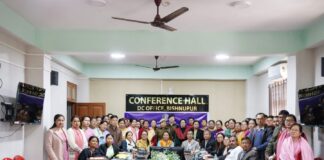Imphal: The Global Manipur Federation, a Seoul-based organization, said in a statement on Friday that for an uninterrupted span of 50 days and counting, the urgent pleas for Prime Minister Modi’s attention on the ongoing crisis in Manipur have fallen on deaf ears.
It said not a single syllable escaped his lips as he departed for the United States, leaving Manipur engulfed in a raging inferno of desperation. This silence has generated significant distress across the state among the people, politicians and civil societies, as their concerns remain unaddressed.
As Manipur burns, the Prime Minister’s profound silence speaks volumes about his indifference and neglect, it added.
In the eyes of New Delhi, Manipur may be insignificant with its only two MPs. But let us not dismiss the significance of this land. It is here that the game of Polo was born. It was here that the world witnessed the longest political hunger strike and embodied a powerful narrative of women empowerment through the “Meira Paibis ( women torch bearers.” Manipur proudly stood as an early champion of universal suffrage in Asia. This land, teeming with biodiversity and abundant natural resources, stands tall as the powerhouse of sports in the Indian subcontinent, it added.
If the world happens to ask about Manipur, envision a hilly terrain with a small valley nestled amidst the majestic Himalayas, gradually descending into the lush green of Southeast Asia. Over the course of centuries, this land has carried different names – Meckley, Meitrapak, and Kangleipak – with ever-changing boundaries that once extended across 72,000 sq km between the Brahmaputra and Chindwin rivers.
Today, Manipur exists within a smaller area, encompassing 22,327 sq km, as an integral part of India. However, its political journey remains unfinished since 1949, it said.
The ongoing crisis in Manipur since May has been affecting thousands of people, including children, women, and the elderly. More than 150 lives have been lost, with over 3,000 houses destroyed and extensive damage to property. Shockingly, over 50,000 people find themselves seeking refuge within their own homeland, akin to real refugees.
The civil population, abandoned by an unresponsive New Delhi, now resorts to self-arming. Women in relief camps plead, “Give us guns to protect our homes and properties. We no longer need groceries and clothes.” 50 days have elapsed with no action from the Central Government and its puppet state administration.
Remarkably, Manipur already hosts around 100,000 central armed personnel, with an additional 40,000 deployed during the crisis. With such military strength, how can New Delhi fail to act effectively? Violence persists unabated since May 3.
What Manipur urgently needs is Confidence Building Measures (CBM). Without CBM, the governments, especially the Government of Manipur, will continue to confront escalating challenges in their pursuit of peace. To address this issue, a conducive atmosphere must be established by disarming militants in and around the foothills.
It suggested rearrangement of central armed forces deployment in the foothills, ending human rights abuses, withdrawing troops, ensuring safe passage on the National Highway 2 in the Kangpokpi area and securing farmers’ livelihoods. Impending famine looms in Manipur as paddy cultivation in the valley is crippled. With 90% of cultivation work halted due to the monsoon, farmers fear venturing into their fields.
Heavily armed Kuki militants lurk in the surrounding foothills, posing a constant threat to the Meitei community. The profound silence of the Prime Minister in the face of Manipur’s crisis only amplifies the urgency for recognition and action it was added.


